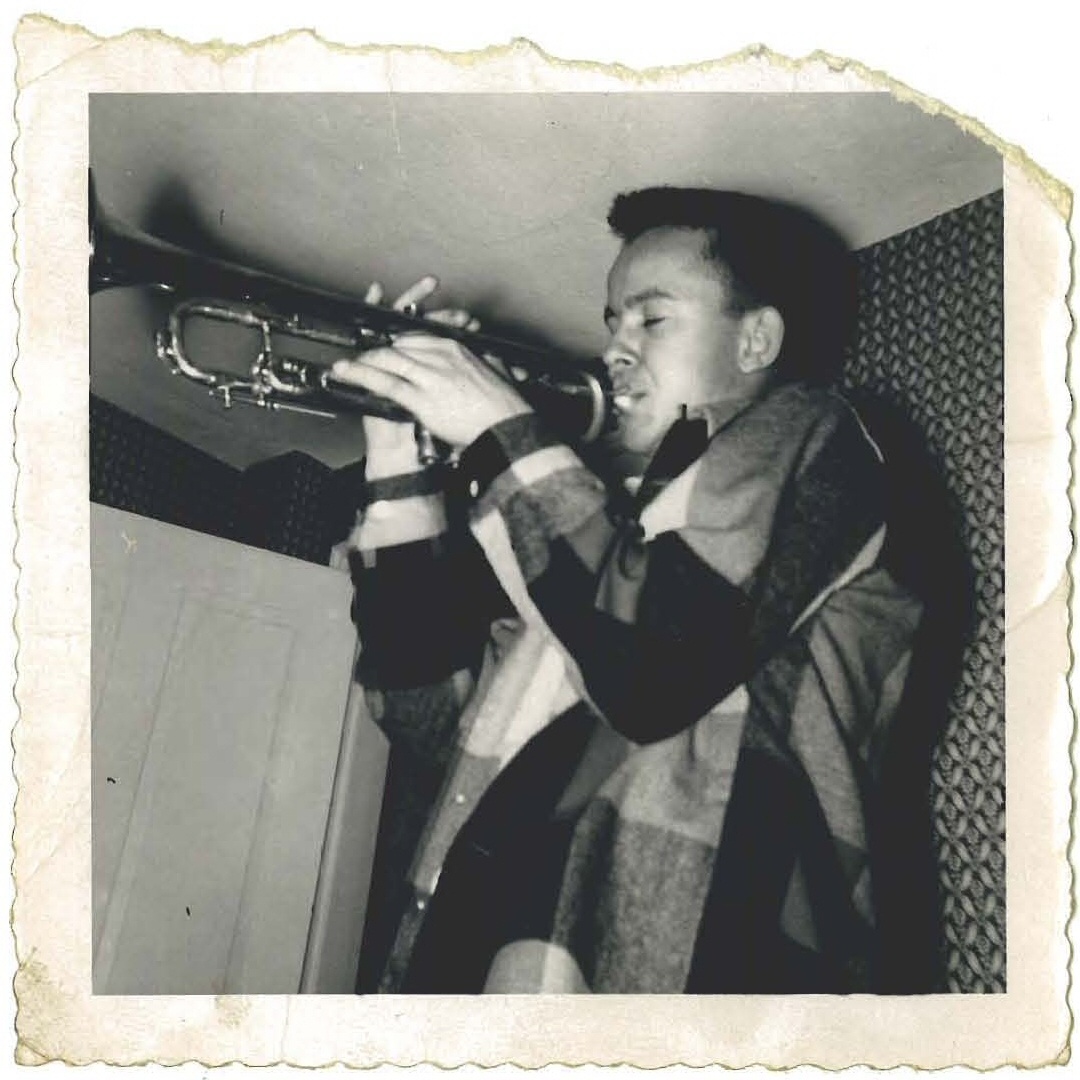
|
|
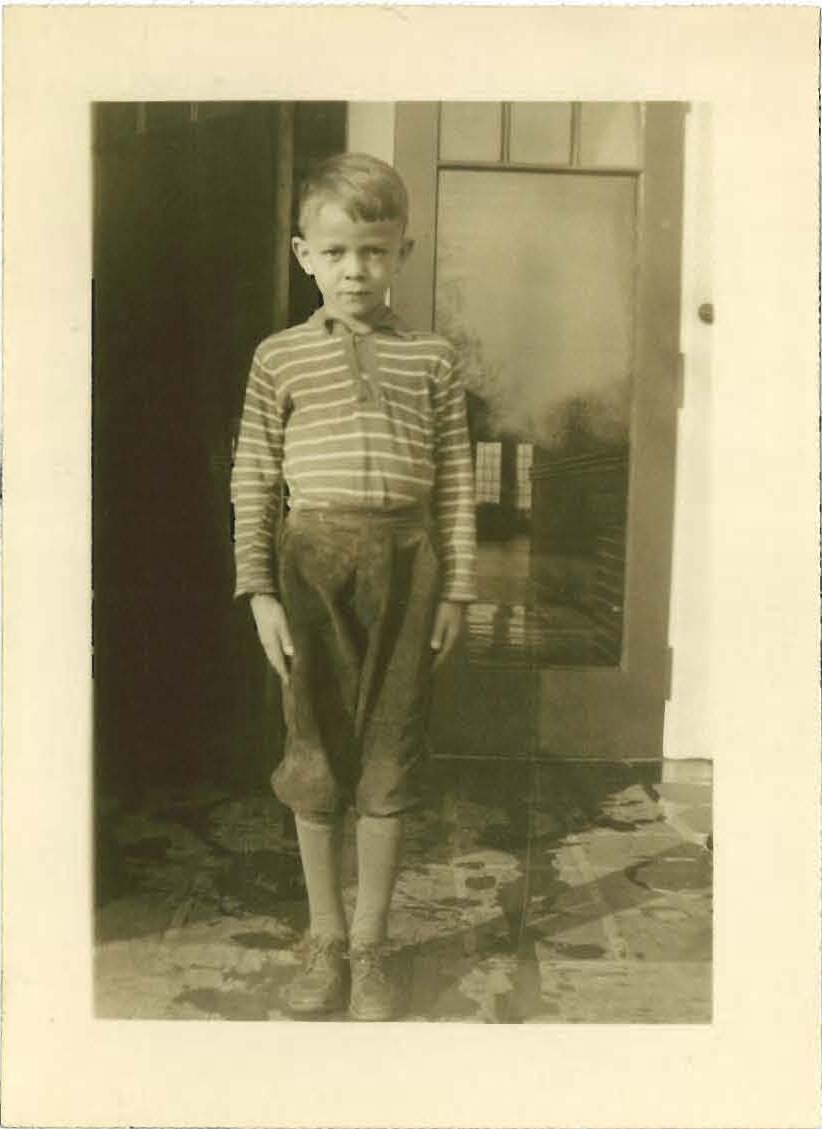
The 30's:
I was born January 17, 1930 in Torrington, Connecticut. Benjamin Franklin and Jean Barraque have the same birth day. When I was two my family moved to Longmeadow, Massachusetts where I lived an American suburban childhood. I began bugle lessons at seven, dancing class at nine with Miss Powers’ instruction at the community center. Being a boy I was much in demand by both Miss Powers and her rival Miss Ryder. The classes met once a week during the school year. Boys were required to wear white gloves. The classes were evenly divided between boys and girls. And many parents thought (I think rightly) that the dance classes, followed in a few years by supper parties and tea dances were the beginning of Longmeadow social life. In fact I was told later that some parents moved to a different community if their daughters were not invited to join a dance class. Alas! It also explains why boys were in demand: one more boy meant one more girl. My favorite girl in the dancing class was Jane Lesueur. (I wonder what ever happened to her?) My best friend was Bobby Small who lived right next door to our house at 121 Farmington Avenue. We had a Polish maid named Julia S. a wonderful person who took care of my two brothers and me, and cooked and cleaned; all for room and board and $16 dollars a week. Her day off was from noon Thursday to noon Friday. Bobby Small’s house featured two maids. The firm where my father worked was bought out and he lost his job. We were forced to move to Williamstown when my father was offered a position with Sprague Electric Company. The year was 1940, and Sprague had a large government contract to make civilian gas masks. My two brothers and I spent the summer of 1940 on my Uncles ranch in Arizona. The ranch was in Chino Valley forty miles from Prescott. The brand burned into the cows’ hide was "diamond and one half". Williamstown was called "the village beautiful" with some justification. By this time my bugle playing had reached the stage where I needed notes in between so I talked my parents into buying a second hand trumpet for twenty dollars. I began studying with Peter Fogg in North Adams who taught all instruments and charged two dollars the half-hour. When I played the assigned lesson especially well he would write "good" on the page of my Arbon Method book. On some occasions he would affix a star.
The 40's:
In 1941 the war began. The town became concerned about teens and how the war would affect them. It was decided that a recreation hall should be opened at the unused town opera house. The directors of the "RECK" hall, as it soon was called, further decided that it would be nice to have a band made up of teens who would play at dances in the hall. The powers further decided that the band should be called "the Junior Jives". Despite the dreadful name the band was wonderful. There were three saxes, drums, piano and trumpet (me). Williams was still having Junior and Senior proms at which "name" bands played. Also the fraternities would have small groups playing on the night after the proms. I would sneak into as many of these band evenings as possible. Other than playing in the "Junior Jives" I enjoyed mostly standing in front of a big band hearing the 5 saxes, 3 trombones, 3 trumpets, and bass drums, and piano. Our house in Williamstown had been built in 1772 and had originally been a tavern where the bread for the battle of Bennington had been baked. The house was on a main road, and one of my fantasies was that a big band bus would stop in front of my house, hear me practicing, and knock on the door to offer me a job. It never happened.
When I reached the seventh grade in the local High School my parents decided to send me to Pine Cobble School, a small private school populated mostly by Williams faculty children. While there I met and began going steady with Jean Matthews the daughter of a Williams professor of biology. One bit of news she told me was that her father, who was on the board of Pine Cobble, told her that I had the highest I.Q. of all the students, and that many college parents were shocked that a son of a Sprague Electric employee had scored higher than their children. In 1945 I went off to Williston Academy from which my older brother had graduated in 1944. Williston offered no music courses, but there was a Band. And in that band was Herb Pomeroy so I can say I played in a band with Herb Pomeroy. I graduated Williston in 1948 and went off to Hobart College in Geneva, New York.
I passed out of the Freshman English requirements which allowed me to take an upper level course taught by a marvelous woman, Dr. Cooke. Her class was outstanding. I took Harmony with Nicholas Tawa who was a fine teacher, but there was no major in music so I began thinking of moving on. So I did. On March 22, 1972 I received a letter from the president of Hobart, Allan Kuusisto, informing me that I had been selected to receive a Sesquicentennial Award from Hobart and that the awards are being presented to persons who have demonstrated themselves to be living examples of the principles embodied in the Sesquicentennial theme of "Knowledge in the Service of Man".
After Hobart I became a special student at Williams College for the academic year 1949-50. I took Robert Barrow’s course in Advanced Harmony and Elementary Composition, and Joachin Nin-Culmel (brother of Anais Nin) courses in Baroque Music and 19th Century Music. Robert Barrow was an interesting teacher: doctrinaire, super organized, conservative, and bitter. Every class we were assigned a melody to harmonize. The solution could be one day late, after which %25 was deducted for each tardy day. His way of teaching secondary 7ths (for example) was to lecture as follows: the 7th and 5th descend by step, the 5th holds or on occasion ascends a 4th. The root ascends by step or a perfect 4th. We did not look at music literature. He also suggested I study counterpoint with him privately. So once a week I went into his office and studied Species Counterpoint exercises out of the Kitson book. I disliked Species Counterpoint with a passion. I suggested that I write an invention in the style of Bach which I did. I can not remember a note of what I wrote. The year I was at Williams was the senior year of Stephen Sondheim who was writing a piano sonata with Barrow and left shards of his sonata in every practice room.

Bop was in the air and even Williams had its Bop Clique led by John Marvin who played tenor (later switching to bass), and Bill Partington who played piano. Marvin had an extensive record collection as well as a complete B flat fake book which he had assembled in his tenor playing days. He gave me the fake book which I still have. I subscribed to Down Beat and Metronome and ordered records from Main Stem records in New York. There was a local black tenor player ( Harry Lewis) who had sessions at his house which was within walking distance of my home. Also there was a black trumpet player by the name of Harry Hart who though not bopper was a fine main stream musician. So the Williams year was indeed interesting. I also smoked my first joint.
The 50's:
The summer after Williams I went to the New England Conservatory Summer School to study more harmony and counterpoint. John Marvin also attended and lived in his brother’s apartment on Beacon Street while his brother was traveling. So while I had my rented room on St. Stephens Street I also had access to the fine apartment on Beacon Street. John and I spent most of our nights at the Hi Hat listening to (among others) the Serge Chaloff quartet which had Nat Pierce on piano and Sonny Truitt on trombone. I received good grades and I liked the Conservatory; I applied for September admission and was accepted.
Boston in the Fall of 1950 was an exciting place especially for a country bumpkin. I lived around the corner from Symphony Hall, and within walking distance of five jazz clubs. Exciting chamber concerts were performed at M. I. T. which I attended with Leroy Parkins, Dick Twardzig, and others. The rear section of the second balcony at Symphony Hall was allotted to rush seats which went on sale for sixty cents every Friday afternoon.
My studies were interesting. As a Composition major I studied with Francis Judd Cooke who in retrospect was the best teacher I ever had. Who one studies composition with is important as well as when. I encountered Cooke at the right time. He grew up in Hawaii, studied music at Yale, was in Skull and Bones, discovered Donald Francis Tovey and read every book of his he could find, and begged his father to allow him to go to the University of Edinburgh to study with Tovey. He went and received first class honors. Cooke’s knowledge of music literature was encyclopedic. His compositional advice serves me well even today.
I met Cecil Taylor who was in his last year as a "popular arranging" major having been denied his wish to switch to Composition. He was a nearly constant companion, and he remains a friend today, after nearly sixty years. My activities with Cecil, Dick Twardzig, Henry Duckham, Richard Ronsheim, and others are delineated in detail in my autobiography. I graduated the Conservatory in 1954 and went off to Mills College to study with Darius Milhaud and Leon Kirchner. After my studies with Cooke I found Milhaud a bit superficial, but very nice. My lessons with Cooke were private, Milhaud taught us all in a seminar. Two occurrences remain in my memory: his wife (Madeleine) would often bring in the mail during our seminar and hand it to Milhaud. Once he said "Ah, Poulenc". On an another occasion when I showed him a few tortured measures he said, not unkindly, "Get out of your match box!".
I studied analysis with Leon Kirchner which was very exciting. I also showed him my own music about which he said some nice things. I read that Aaron Copland was not teaching at Tanglewood and would be replaced by Roger Sessions. I asked Kirchner if he would write a recommendation for me. He said he would write directly to Sessions. I guess he did because I received a full scholarship (as did every one), and flew back East for the summer of 1955 at Tanglewood.
Oh to be young and at Tanglewood! My fellow composer students included Ed Miller, Sal Martirano, Al Daniels and other interesting folks. George Crumb was studying with Boris Blacher. The String Trio I wrote my senior year at the Conservatory was performed. Much more about that summer is detailed in my autobiography.
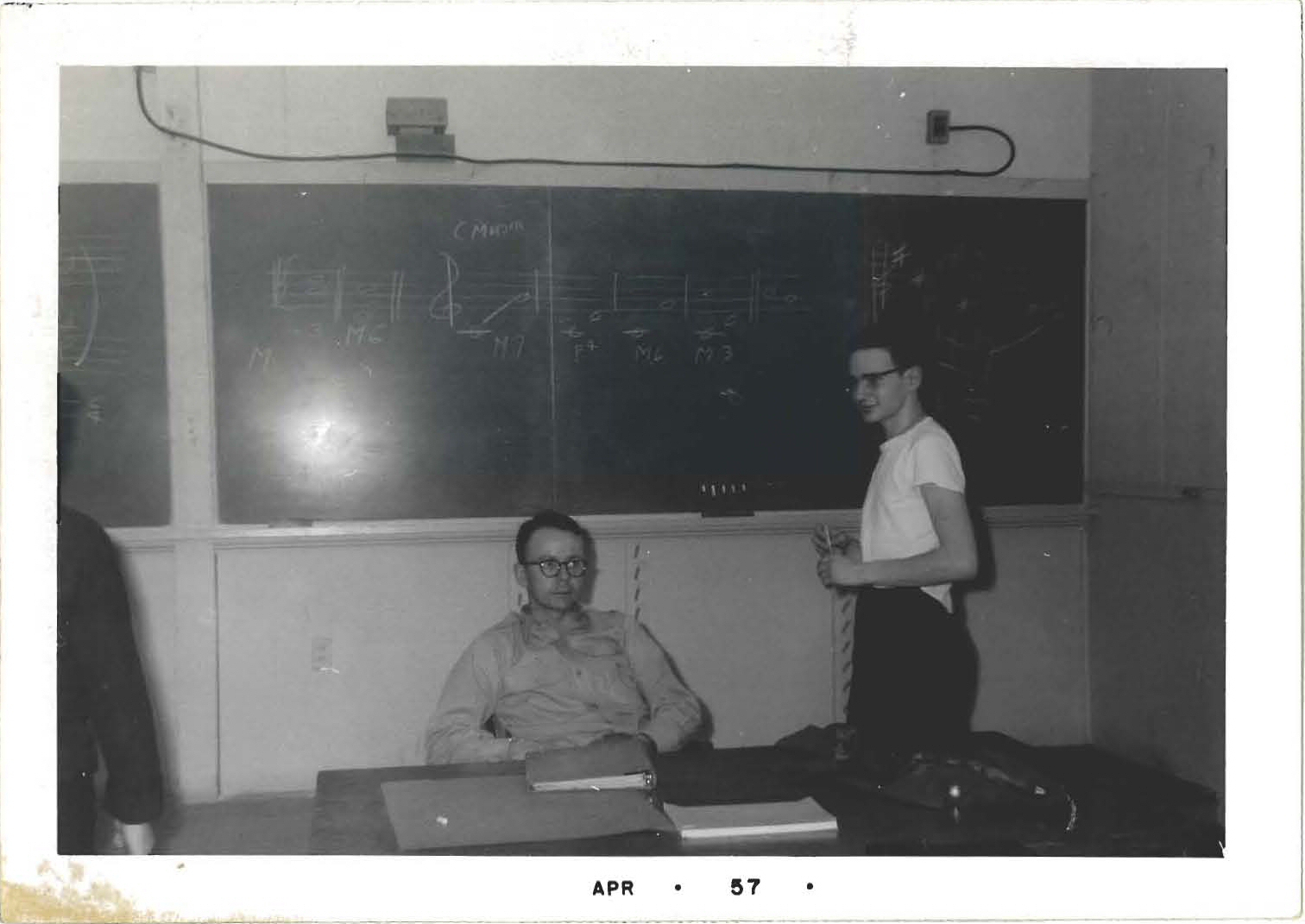 In the Fall I left for New York City renting a room from
Ralph Shapey in his apartment on 186th Street in the Bronx. Al
Daniels had a loft on Bond street, and found
a job for both of us at the Institute for Management as alphabet-
tizers. My New York
sojourn ended when I was drafted. I thought since I was twenty-five
the army had forgotten me. But off I went on September 13 to Ft. Dix,
New Jersey.
In the Fall I left for New York City renting a room from
Ralph Shapey in his apartment on 186th Street in the Bronx. Al
Daniels had a loft on Bond street, and found
a job for both of us at the Institute for Management as alphabet-
tizers. My New York
sojourn ended when I was drafted. I thought since I was twenty-five
the army had forgotten me. But off I went on September 13 to Ft. Dix,
New Jersey.
After basic training and a short stint at a NIKE site in Fort Niagara, New York I ended up at the Naval School of Music in Washington, D.C. teaching Music Theory and Ear Training. Rom Ferri, Dorance Stalvey, and Martin Mailman were fellow faculty. Chamber Music concerts at the Library of Congress and the National Symphony conducted by Howard Mitchell performing in Constitutional Hall were accessible for one dollar plus my service I.D. So my two-year army stint was quite tolerable. Buck Hill was performing at 7th and T, playing some of the best jazz in Washington
Al Daniels started graduate school at Princeton. I decided to apply. I did and I was accepted and awarded the Roy Dickinson Welch Fellowship. I left the army on September 12, 1957 and moved on to Princeton a week later. Ah Princeton! My fellow students were very bright, the teachers were excellent, and food at the grad college was quite good. I took Oliver Strunk’s courses in polyphonic music and Wagner, Babbitt’s course on Music Theory, a pro- seminar with Earl Kim, and on a lark I audited R.P. Blackmur’s courses in Poetics which I still think about nearly every day. More Princeton doings in my auto-biography.
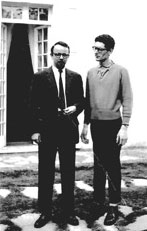
The 60's:
After two years of grad school I went to New York and sublet a fifth floor railroad flat on East 75th street for forty-one dollars and twenty-two cents a month. I obtained a job at National City Bank for $1.50 an hour working from quarter of five in the afternoon until quarter of two the following morning. My co-workers were mostly unemployed actors and musicians. The radio played jazz or WQXR. Fascinating as this all was I quit after seven months and drew un- employment insurance of 28 dollars a week which I actually lived on.
Rolv Yttrehus was teaching music at The Lawrenceville School, and had been awarded an Italian government grant to study in Rome for a year. He arranged for me to replace him. He also sold me his 1937 Chevrolet for fifty dollars. Off to Lawrenceville where I taught basic music and lead the band. At Lawrenceville I heard of a former teacher who was head of Robert Academy in Istanbul. I wrote to him (Cornelius Bull) to ask if there was an opening for a music teacher. There was. In September I flew on a charter flight with new and returning faculty; we arrived in Istanbul 27 hours after leaving New York with stops in Prestwick and Copenhagen. I met a young girl (Jonatha Kropp) from Kingston, Ontario who had just graduated Vassar and was hired to teach second grade at the Community School. We fell in love and were married in a Turkish Civil ceremony on January 13, 1962. We were married at the beginning of Ramadan and were able to spend three weeks in Rome on our honeymoon. Rolv, Fred Rzewski, and Alvin Lucier were there on various grants. We tooled around Rome in Rolv’s Topolino.
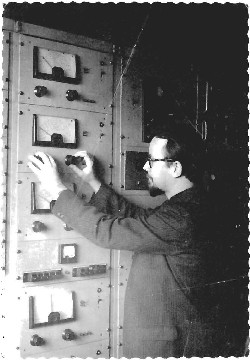 Since both Jonatha and I loved our brief three weeks in Rome
we decided to leave Istanbul after two years and live in Italy. In
order of preference we listed Rome, Florence,
and Milan. Jonatha was offered a job teaching in an American School in
Milan. Prior to
settling in Milan we attended the courses at Darmstadt. In Milan we
lived at 8 via Vittoria
Colonna near the Piazza Buonarotti with a statue of Verdi in the
center, and the home for
retired musicians with the tomb of Verdi and his wife in the basement.
Milan was the home of one of the best Electronic Music Studios (the
Studio di Fonologia), and I knew that Berio lived in Milan when he
wasn’t teaching at Mills so I wrote Margaret Lyon at Mills and she
wrote a letter of introduction to Berio on my behalf. With Berio’s
clout and help from a nice man at the US Information Agency I was
invited to work in the studio.
Since both Jonatha and I loved our brief three weeks in Rome
we decided to leave Istanbul after two years and live in Italy. In
order of preference we listed Rome, Florence,
and Milan. Jonatha was offered a job teaching in an American School in
Milan. Prior to
settling in Milan we attended the courses at Darmstadt. In Milan we
lived at 8 via Vittoria
Colonna near the Piazza Buonarotti with a statue of Verdi in the
center, and the home for
retired musicians with the tomb of Verdi and his wife in the basement.
Milan was the home of one of the best Electronic Music Studios (the
Studio di Fonologia), and I knew that Berio lived in Milan when he
wasn’t teaching at Mills so I wrote Margaret Lyon at Mills and she
wrote a letter of introduction to Berio on my behalf. With Berio’s
clout and help from a nice man at the US Information Agency I was
invited to work in the studio.
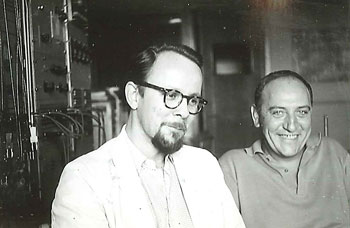 Marino Zuccheri was the very simpatico engineer, Luigi Nono
would travel from Venice to work on his piece for the Venice Festival.
In his white pants and colorful shirts Nono was a contrast to the
conservatively dressed Italian RAI workers. Also Nono, being communist
always used the intimate form in conversing with me which aided my
Italian skills. I composed two pieces while at the studio: Stratti and
Elegia. We became friends of
Niccolo Castiglione with whom we usually had dinner on Monday nights
in a neighborhood
trattoria. After our second summer in Milan we decided to return to
the United States. Jonatha believed that she needed a masters degree
if she were to teach, and I thought I should investigate the
possibility of obtaining a Ph. D.
Marino Zuccheri was the very simpatico engineer, Luigi Nono
would travel from Venice to work on his piece for the Venice Festival.
In his white pants and colorful shirts Nono was a contrast to the
conservatively dressed Italian RAI workers. Also Nono, being communist
always used the intimate form in conversing with me which aided my
Italian skills. I composed two pieces while at the studio: Stratti and
Elegia. We became friends of
Niccolo Castiglione with whom we usually had dinner on Monday nights
in a neighborhood
trattoria. After our second summer in Milan we decided to return to
the United States. Jonatha believed that she needed a masters degree
if she were to teach, and I thought I should investigate the
possibility of obtaining a Ph. D.
We arrived in the United States aboard the Mauritania in the fall of 1964. We made our way to Ann Arbor, Michigan, where Jonatha enrolled for the masters program in Comparative Literature. I debated beginning a Ph. D in Composition, but instead I helped support us by working for the Institute for Social Research coding sociological surveys. We rented a house in Pinckney which had a space heater which scared us, but we survived. By the end of August of 1965 Jonatha had her M.A. in comparative literature. We headed East. I attended the MOOG Seminar in Electronic Music held in Trumansburg, New York.
Jonatha secured a teaching position in a private girls school in the Boston area and I eventually obtained a job recording language and music tapes at Harvard. After six months I was offered a position teaching harmony and ear training at the New England Conservatory.
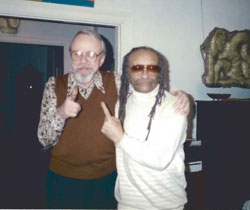
The Present:
Thus began 38 years of teaching at the conservatory during which there were seven presidents; I received yearly contracts; and I received a one semester sabbatical. Gunther Schuller’s tenure I found the most exciting; I think history has proven - at least to me - that composers make the best conservatory presidents. Gunther, along with Don Martino, encouraged my interest in establishing an electronic music studio which I did and became its director moving me from the theory department to the Composition department. In 1969 I was awarded a Fromm commission to compose music for a ballet to choreography by James Warring. I received an outstanding alumnus award in 1995.
I am now retired from teaching but more engaged in Composition. While I miss some of my students I do not miss teaching. Jonatha has also stopped teaching and has written two novels. To follow her career check her web site at jonathaceely.com.
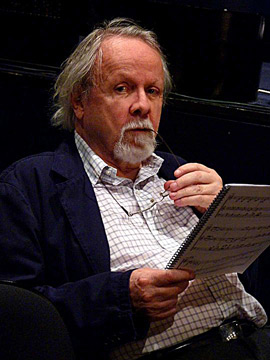
Robert Ceely died in the evening of January 28, 2015 at St. Elizabeth’s Hospital, Brighton MA. He had been admitted earlier the same day, and even though he suffered from congestive heart disease, his death from a catastrophic cardiac arrest was unexpected. A service of remembrance was held February 6, 2015 at the Lucy Stone Chapel, Forest Hills Cemetery, Boston MA, followed by cremation. Speakers remembered Robert Ceely as a family member, a fellow student, a friend, a teacher, and a musician.
Robert Ceely’s ashes are interred at Forest Hills Cemetery, a garden cemetery since 1848, which is listed in the National Register of Historic Places. You can view the guest book here.
Please honor Robert Ceely by listening to and advocating for his music.
|
|
|
| Main Page | Recordings | Compositions | Interview | Contact | Links | |